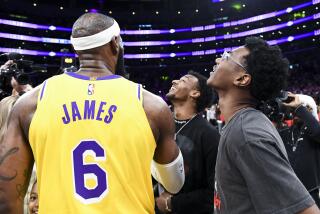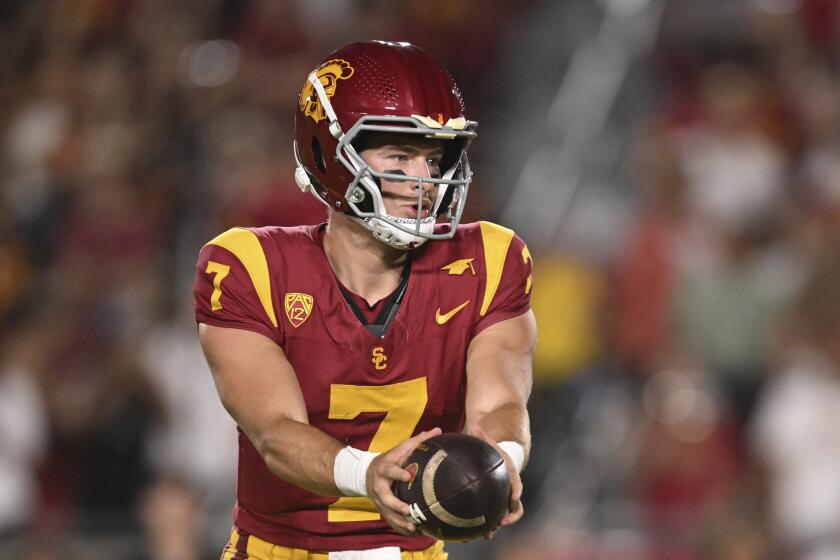Man who covered the greats now in the spotlight
Arnold Hano has always been the man behind the pen, writing down words, telling the story of others, never in the spotlight himself. So it is understandable that the 93-year-old might wince at the idea that he would be the focus of a movie.
The Laguna Beach resident, who moved to the city with his wife, Bonnie, in 1955, has witnessed some of baseball’s most storied moments, as a fan and a writer.
Hano grew up a block from the Polo Grounds in New York City and was in the stadium when Giants’ outfielder Willie Mays made an over-the-shoulder catch to rob Cleveland’s Vic Wertz of a potential extra-base hit in Game 1 of the 1954 World Series.
Two years later, Hano watched Yankees pitcher Don Larsen toss a perfect game in the 1956 World Series, the only time someone has accomplished that feat in the championship series. He has the game’s scorecard in his Laguna Beach home.
It’s Hano’s insight from these experiences and others that filmmaker Jon Leonoudakis attempted to capture in an hourlong documentary titled “Hano! A Century in the Bleachers.” The film premieres with a free screening Oct. 14 at the Laguna Beach venue [seven-degrees].
While baseball is Hano’s favorite sport, the Giants’ fan has homed in on various social justice issues when writing freelance stories for the New York Times, Los Angeles Times and TV Guide. Hano has written 27 books, including one dedicated to Laguna titled “It Takes a Villager” and a biography of Mays, which Leonoudakis read as an 8-year-old in 1966.
Hano and Leonoudakis met six years ago at a meeting of the Baseball Reliquary, a nonprofit, educational organization dedicated to fostering an appreciation of American art and culture through the context of the sport’s history. Hano’s name came to mind when Leonoudakis was wrapping up a film titled “The Day the World Series Stopped,” about the Loma Prieta earthquake causing baseball officials to postpone Game 3 of the 1989 World Series in San Francisco.
“I decided to do research on [Hano], and something tugged at my sleeve,” Leonoudakis said. “I realized there is much more to this person. He had a huge part in chronicling the American experience of the 20th century.”
Leonoudakis asked himself, “Why hasn’t anyone sat him in front of a camera? This guy is an American treasure.” Leonoudakis’s first interview with Hano for the newest film was held in November 2013 and lasted three hours.
Hano, who in 1963 was voted magazine sports writer of the year by his peers and received the prestigious Sidney Hillman prize for a story on the mistreatment of California’s migrant workers, was humble when asked about Leonoudakis’s idea for the documentary.
“[Leonoudakis] said I would be the star subject,” Hano recalled earlier this week at his home. “I have no star qualities. I think he was trying to make me into Robert Redford” — who played Roy Hobbs in the classic baseball movie “The Natural.”
“I didn’t know what I was going to do [with the information],” Leonoudakis said. “He spun gold. He has a magnificent memory and we hardly scratched the surface.”
Crews filmed scenes in San Francisco, Tempe, Ariz., and New York.
Hall of Famer Orlando Cepeda, former Giants’ player and manager Felipe Alou, and prominent sportswriters Ray Robinson, John Schulian and Al Silverman add their perspectives on Hano, a civic activist who decried inequality in Laguna Beach during the 1960s with a column about a local barber refusing to cut an African American man’s hair.
In interviewing players from Latin America countries, Hano learned about some of the obstacles that came with the intermingling of cultures.
Hano recalled an incident in the ‘60s when the cultural differences in the dugout led to an unfortunate miscommunication.
In the hours leading up to an August game in Pittsburgh Pirates’ Hall of Famer Roberto Clemente told the manager that his shoulder hurt.
The manager, who had asked Clemente how he was doing, took the ballplayer’s answer as a serious complaint and benched him for the game. The media reported the incident and the public viewed Clemente as a malcontent, Hano said.
But Hano explained that Latino ballplayers answered questions like “How are you doing?” literally instead of giving the more conventional response of “fine.”
“Clemente was not saying he couldn’t play,” Hano said. At that time in the season, Hano said, as their bodies wear down, players are susceptible to injuries, and Clemente was just stating that he was feeling some of that pain.
“There was a cultural miscommunication,” he said.
Hano is not working on another book or writing project at the moment. He is closely following the city’s attempts to underground utility wires and remove poles and is battling what he calls the “mansionization” of Laguna Beach.
More than anything else, Leonoudakis hopes viewers will see Hano as a humanitarian.
“He lives his beliefs,” Leonoudakis said. “He is not someone who writes from an ivory tower.”
Hano and Leonoudakis will be on hand for the documentary, which will begin at 7 p.m. [seven-degrees] is located at 891 Laguna Canyon Road. DVD copies of the movie will be on sale for $20.
For more information on Hano and the movie, visit hanodoc.com.
More to Read
Get our high school sports newsletter
Prep Rally is devoted to the SoCal high school sports experience, bringing you scores, stories and a behind-the-scenes look at what makes prep sports so popular.
You may occasionally receive promotional content from the Los Angeles Times.







